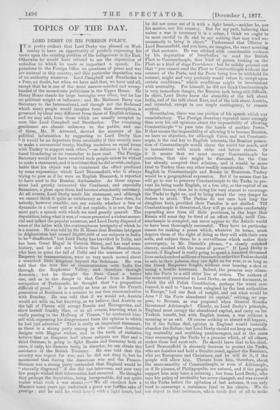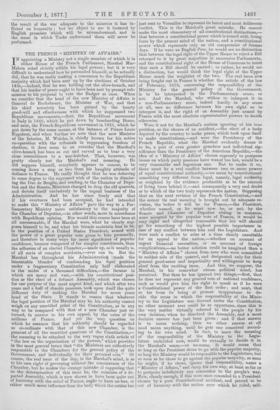TOPICS OF THE DAY.
LORD DERBY ON HIS FOREIGN POLICY.
IT ispretty evident that Lord Derby was pleased on Wed- nesday to have an opportunity of publicly expressing his -views upon the existing position of the belligerents in the East. Otherwise he would have refused to see the deputation of nobodies to which he made so important a speech. De- putations to the Foreign Office on questions of peace and war are unusual in this country, and this particular deputation was of no authority whatever. Lord Campbell and Stratheden is a Peer, no doubt, but when we have said that, we have said all, except that he is one of the most narrow-minded and wrong- headed of the second-rate politicians in the Upper House. Sir Henry Hoare stands for large boroughs very often, but he has no political weight or influence ; and Mr. Maltman Barry was Secretary to the International, and though not the firebrand which many people would imagine from that description, is governed by ideas very different from those of English artisans, and we may add, from those which are usually accepted by men like Lord Campbell and Stratheden. The remaining gentlemen are almost unknown to the public, and one of them,„ Mr. H. Attwood, showed the measure of his political information by suggesting to Lord Derby that "it would be no departure from neutrality if this country were to make a commercial treaty, binding ourselves on equal terms with Turkey to support each other,"—as delicious a bit of con- fused blundering as we remember to have read. The Foreign Secretary would not have received such people unless he wished to make a statement, and it is evidentthat he did so wish, and pro- bable that his object was to counteract the effect produced by some expressions which Lord Beaconsfield, who is always trying to pose as if he were an English Biemare,k, is reported to have used to the Russian Ambassador. As those expres- sions had greatly interested the Continent, and especially financiers, a gloss upon them had become abundantly necessary. At all events, Lord Derby made his statement, and although we cannot think it quite as satisfactory as the Times does, for nobody, however sensible, can say exactly whether a box of dynamite in a closet will or will not explode, it is not, for the most part, a speech with which we need greatly quarrel. The deputation, being what it was, of course presented a violent memo- rial and talked the popular nonsense, and Lord Derby disposed of some of the latter with the contemptuous benignity of which he is a master. He was told by Sir H. Hoare that Russian intrigues in Afghanistan had caused 50,000,000 of our subjects in India to be " disaffected," but Lord Derby has travelled in India, and has been Great Mogul in Cannon Street, and has read some history, and he did not 'believe that Indian Mussulmans, who bore in quiet the fall of Delhi and the sentence of their Emperor to transportation, were so very much moved about a wretched little kingdom beyond the Suleiman. He was told that the true line of communication with India lies through the Euphrates Valley, and therefore through Armenia ; but he thought the Suez Canal a better one, and as to the danger to that Canal from a Russian occupation of Trebizonde, he thought that "a proposition difficult of proof." It is exactly as true as that the French possession of Bordeaux is a menace to our free communication with Bombay. He was told that if we would act, Austria would act with us, but knowing, as we believe, that Austria on the fall of Plevna will occupy Bosnia and Herzegovina, and shew herself frankly Slav, or at all events, knowing what is really passing in the Hofburg of Vienna, "be contented him- self with expressing his disagreement from the opinion to which he had just adverted." That is really an important statement, as there is a strong party among us who confuse Austrian designs with Magyar wishes, and in the teeth of statistics believe that an Emperor half whose subjects are Slav and a third German, is going to fight Russia and Germany both at once, if only, his finances being in disorder, he can obtain the assistance of the British Treasury. He was told that the country was urgent for war, and he did not deny it, but he mentioned that during the American war and the Franco- German war a strong party contended that England would be "eternally disgraced" if she did not intervene, and now very few people wished that intervention had occurred. He thought that perhaps the deputation, being irresponsible, did not quite realise what such a war meant We all recollect how a Minister some years ago undertook a great war foillthe sake of prestige ; and he said he went into it with a light heart, but he did not come out of it with a light heart,—neither he, nor his master, nor his country. But for my part, believing that unless a war is necessary it is a crime, I think we ought to- be most careful to do and to say nothing that may tend un- necessarily to bring it about." Understand that 011ivier is Lord Beaconsfield, and you have, we imagine, the exact meaning of that sentence. He was advised with considerable coolness by his deputation of busybodies to send the British Fleet to Constantinople, that kind of person looking on the Fleet as a kind of stage Providence ; but he mildly pointed out that "you cannot send the Fleet to Constantinople without the consent of the Porte, and the Porte being free to withhold its consent, might and very probably would refuse it, except upon certain conditions," which conditions might be inconsistent with neutrality. For himself, he did not think Constantinople in very immediate danger, the Russian task being still difficult. In short, Lord Derby knew the absurdity of the talk about. India, and of the talk about Kars, and of the talk about Austria„ and intended, except in one single contingency, to remain neutral.
Nevertheless, there was one portion of his speech which was unsatisfactory. The Foreign Secretary repeated more strongly than ever his old opinions about the impossibility of allowing Constantinople "to pass into the hands of another Power.' If that means the impossibility of allowing it to become Russian,. we have no objection, for although Cairo, and not Constanti- nople, is the real key to English interests, the Russian posses- sion of Constantinople would alarm the world too much, and is inconsistent with much older and better claims. Or if it means that we must occupy Constantinople for ourselves, that also might be discussed, for the Czar has already accepted that solution, and it would be more fatal to Turkey than any other readily conceivable. With the English in Constantinople and Russia in Erzeroum, Turkey would be a geographical expression. But if he means that he will go to war to preserve Constantinople to the Turks, to pre- vent its being made English, or a free city, or the capital of an enlarged Greece, then he is doing his very utmost to encourage the Turks to fight on, and to bring about the very danger he desires to avoid. The Pashas do not care how long the slaughter lasts, provided their Paradise is not shelled. Till Constantinople is threatened, they will go on quite comfortably expending men from all their provinces, in the hope that Russia will some day be tired of an effort which, until Con- stantinople is occupied, can never appear to the Asiatic world to have been thoroughly successful. They have no particular. reason for making a peace which, whatever its terms, must deprive them of the right of doing as they will with their owrv serfs, and subject them to a surveillance which makes their sovereignty, in Mr. Disraeli's phrase, "a closely watched slavery, mocked with the name of power." If Lord Derby is sincere, if England is really going to spend a hundred thousand lives and ahundred millions of treasure in order that Pashas should be safe in their palaces, they can fight on for ever, or as long as the Greek Emperors fought, without ever hearing a shot or seeing a hostile horseman. Indeed, the promise may stimu- late the Porte to a still abler line of action. The authors of the memorial presented to Lord Derby, an absurd document, in which the old Polish Constitution, perhaps the worst ever framed, is said to "have been eulogised by the best authorities in Europe," had one flash of insight, and ask what would be done "if the Porte abandoned its capital," retiring, we sup- pose, to Broussa, as was proposed when General Gourko threatened Adrianople ? Clearly, on Lord Derby's principle, England must occupy the abandoned capital, and carry on for Turkish benefit, but with English means, a war without a meaning or an end. Of course nothing so absurd will happen, for if the Sultan fled, opinion in England would instantly abandon the Sultan; but Lord Derby should not keep on preach- ing neutrality and snubbing panicmongers, and at the same time encouraging the Turks by a promise which, of all others, makes them feel most safe. He should leave that to his chief. Lord Beaconsfield is sincerely desirous to protect the Turks, who are Asiatics and hold a Semitic creed, against the Russians, who are Europeans and Christians, and he will do it, if the people will allow him. Threats from him, therefore, about the sacro-sanctity of Constantinople, or even of Adrianople, or if lie pleases, of Philippopolis, are natural, and if the people support him may have a meaning ; but from Lord Derby, who says his policy of neutrality has never changed, and was avowed to the Turks before the agitation of last autumn, it can only tend to encourage a resistance fatal to his clients. We do not object to that resistance, which tends first of all to make the result of the war adequate to the miseries it has in- flicted on humanity ; but we object to see it fostered by English promises which will be misunderstood, and in the sense in which Turks understand them will never be performed.







































 Previous page
Previous page